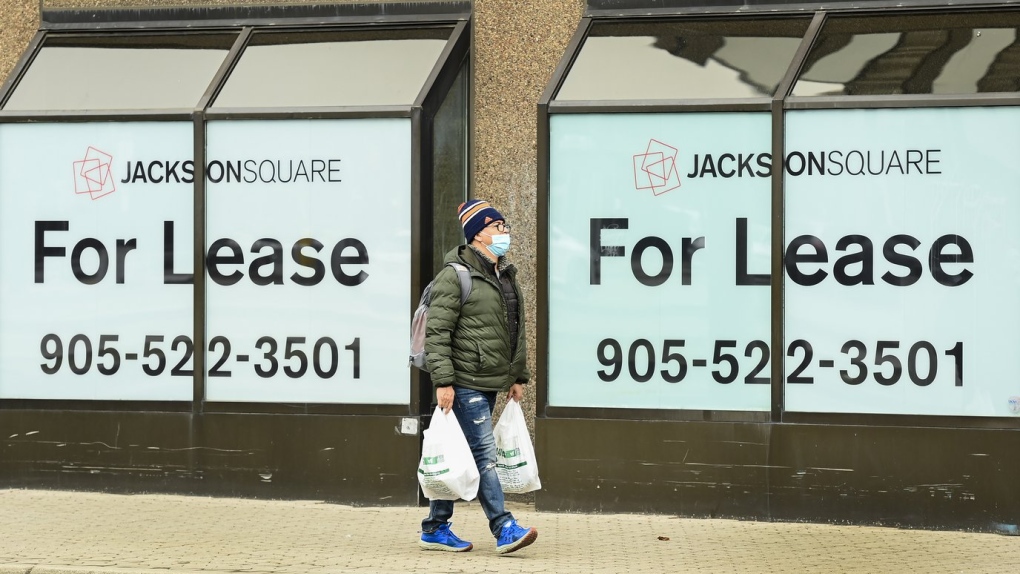Small businesses continue to struggle post pandemic: report
 A man walks past office lease signs during the COVID-19 pandemic in downtown Hamilton, Ont., on Thursday, March 18, 2021. THE CANADIAN PRESS/Nathan Denette
A man walks past office lease signs during the COVID-19 pandemic in downtown Hamilton, Ont., on Thursday, March 18, 2021. THE CANADIAN PRESS/Nathan Denette
Small business insolvency numbers continue to rise in Canada post-pandemic, but a recent report shows that current bankruptcy statistics aren't telling the whole story when it comes to small business closures in our country.
The report, released last month by the Canadian Federation of Independent Business (CFIB), says that given the choice, nearly half of small businesses would not file for bankruptcy. Some 46 per cent of those surveyed said they would simply close their doors and go out of business. Only 7 per cent said they would actually file for bankruptcy.
Kathleen Cook, director of provincial affairs for the CFIB in Manitoba says the results make sense.
"Bankruptcy can be a little more devastating financially for anyone, and it is a lot more work," she said, "so if it's possible to simply liquidate your assets and sell your business, or close it down, that’s probably the option you would choose as a business owner."
The report says that small businesses in Canada continue to struggle, even as health restrictions are lifted and the pandemic ends. Insolvency numbers were highest in the construction, accommodation, and food services industries.
Cook says there a number of different factors at play, debt being one of them, "Many small businesses took on significant debt during the pandemic just to keep their doors open, and now those bills are coming due."
As well, she says high interest rates, inflation, and labour shortages are all making it a very challenging time to run a small business.
She says locally, our numbers aren't as bad as the rest of the country. "In Manitoba, insolvencies have actually been fairly stable," said Cook.
But Cook says the CFIB would like to see the government track insolvency numbers better. Currently only actual bankruptcies are recorded, with the rest of the closures going undocumented.
"What we're giving them here is data that says these are the number of businesses that could close," said Cook, "here's the risk, and here's what you can do to help them."
CTVNews.ca Top Stories

opinion Tom Mulcair: Prime Minister Justin Trudeau's train wreck of a final act
In his latest column for CTVNews.ca, former NDP leader and political analyst Tom Mulcair puts a spotlight on the 'spectacular failure' of Prime Minister Justin Trudeau's final act on the political stage.
B.C. mayor gets calls from across Canada about 'crazy' plan to recruit doctors
A British Columbia community's "out-of-the-box" plan to ease its family doctor shortage by hiring physicians as city employees is sparking interest from across Canada, says Colwood Mayor Doug Kobayashi.
'There’s no support': Domestic abuse survivor shares difficulties leaving her relationship
An Edmonton woman who tried to flee an abusive relationship ended up back where she started in part due to a lack of shelter space.
opinion King Charles' Christmas: Who's in and who's out this year?
Christmas 2024 is set to be a Christmas like no other for the Royal Family, says royal commentator Afua Hagan. King Charles III has initiated the most important and significant transformation of royal Christmas celebrations in decades.
Can the Governor General do what Pierre Poilievre is asking? This expert says no
A historically difficult week for Prime Minister Justin Trudeau and his Liberal government ended with a renewed push from Conservative Leader Pierre Poilievre to topple this government – this time in the form a letter to the Governor General.
Baseball Hall of Famer Rickey Henderson dead at 65, reports say
Rickey Henderson, a Baseball Hall of Famer and Major League Baseball’s all-time stolen bases leader, is dead at 65, according to multiple reports.
Arizona third-grader saves choking friend
An Arizona third-grader is being recognized by his local fire department after saving a friend from choking.
Germans mourn the 5 killed and 200 injured in the apparent attack on a Christmas market
Germans on Saturday mourned the victims of an apparent attack in which authorities say a doctor drove into a busy outdoor Christmas market, killing five people, injuring 200 others and shaking the public’s sense of security at what would otherwise be a time of joy.
Blake Lively accuses 'It Ends With Us' director Justin Baldoni of harassment and smear campaign
Blake Lively has accused her 'It Ends With Us' director and co-star Justin Baldoni of sexual harassment on the set of the movie and a subsequent effort to “destroy' her reputation in a legal complaint.


































